- Home
- Leigh Bardugo
Six of Crows Page 6
Six of Crows Read online
Page 6
Twenty million kruge. What kind of job would this be? Kaz didn’t know anything about espionage or government squabbles, but why should stealing Bo Yul-Bayur from the Ice Court be any different from liberating valuables from a mercher’s safe? The most well-protected safe in the world, he reminded himself. He’d need a very specialized team, a desperate team that wouldn’t balk at the real possibility that they’d never come back from this job. And he wouldn’t be able to just pull from the Dregs. He didn’t have the talent he’d need in their ranks. That meant he’d have to watch his back more than usual.
But if they managed it, even after Per Haskell got his cut, Kaz’s share of the scrub would be enough to change everything, to finally put into motion the dream he’d had since he’d first crawled out of a cold harbor with revenge burning a hole in his heart. His debt to Jordie would be paid at last.
There would be other benefits, too. The Kerch Council would owe him, to say nothing of what this particular heist would do for his reputation. To infiltrate the impenetrable Ice Court and snatch a prize from the bastion of Fjerdan nobility and military might? With a job like this under his belt and that kind of scrub at his fingertips, he wouldn’t need Per Haskell anymore. He could start his own operation.
But something was off. “Why me? Why the Dregs? There are more experienced crews out there.”
Mikka started to cough, and Kaz saw blood on his sleeve.
“Sit,” Van Eck instructed gently, helping Mikka into a chair and offering the Grisha his handkerchief. He signaled to a guard. “Some water.”
“Well?” prodded Kaz.
“How old are you, Mister Brekker?”
“Seventeen.”
“You haven’t been arrested since you were fourteen, and since I know you are not an honest man any more than you were an honest boy, I can only assume you have the quality I most need in a criminal: You don’t get caught.” Van Eck smiled slightly then. “There’s also the matter of my DeKappel.”
“I’m sure I don’t know what you mean.”
“Six months ago, a DeKappel oil worth nearly one hundred thousand kruge disappeared from my home.”
“Quite a loss.”
“It was, especially since I had been assured that my gallery was impenetrable and that the locks on its doors were foolproof.”
“I do seem to remember reading about that.”
“Yes,” admitted Van Eck with a small sigh. “Pride is a perilous thing. I was eager to show off my acquisition and the lengths I’d gone to in order to protect it. And yet, despite all my safeguards, despite dogs and alarms and the most loyal staff in all of Ketterdam, my painting is gone.”
“My condolences.”
“It has yet to surface anywhere on the world market.”
“Maybe your thief already had a buyer lined up.”
“A possibility, of course. But I’m inclined to believe that the thief took it for a different reason.”
“What would that be?”
“Just to prove that he could.”
“Seems like a stupid risk to me.”
“Well, who can guess at the motives of thieves?”
“Not me, certainly.”
“From what I know of the Ice Court, whoever stole my DeKappel is exactly who I need for this job.”
“Then you’d be better off hiring him. Or her.”
“Indeed. But I’ll have to settle for you.”
Van Eck held Kaz’s gaze as if he hoped to find a confession written between his eyes. At last, Van Eck asked, “We have a deal then?”
“Not so fast. What about the Healer?”
Van Eck looked baffled. “Who?”
“You said you gave the drug to a Grisha from each Order. Mikka’s a Tidemaker—he’s your Etherealnik. The Fabrikator who mocked up that gold was a Materialnik. So what happened to the Corporalnik? The Healer?”
Van Eck winced slightly, but simply said, “Will you accompany me, Mister Brekker?”
Warily, keeping one eye on Mikka and the guards, Kaz followed Van Eck out of the library and down the hall. The house dripped mercher wealth—walls paneled in dark wood, floors tiled in clean black and white, all in good taste, all perfectly restrained and impeccably crafted. But it had the feel of a graveyard. The rooms were deserted, the curtains drawn, the furniture covered in white sheets so that each shadowy chamber they passed looked like some kind of forgotten seascape cluttered with icebergs.
Hoede. Now the name clicked into place. There’d been some kind of incident at Hoede’s mansion on the Geldstraat last week. The whole place had been cordoned off and crawling with stadwatch. Kaz had heard rumors of a firepox outbreak, but even Inej hadn’t been able to learn more.
“This is Councilman Hoede’s house,” Kaz said, skin crawling. He wanted no part of a plague, but the merch and his guards didn’t seem remotely concerned. “I thought this place was under quarantine.”
“What happened here is no danger to us. And if you do your job, Mister Brekker, it never will be.”
Van Eck led him through a door and into a manicured garden, thick with the new nectar scent of early crocuses. The smell hit Kaz like a blow to the jaw. Memories of Jordie were already too fresh in his mind, and for a moment, Kaz wasn’t walking through the canal-side garden of a rich merch, he was knee-deep in spring grasses, hot sun beating down on his cheeks, his brother’s voice calling him home.
Kaz gave himself a shake. I need a mug of the darkest, bitterest coffee I can find, he thought. Or maybe a real punch to the jaw.
Van Eck was leading him to a boathouse that faced the canal. The light filtering out between its shuttered windows cast patterns on the garden path. A single city guard stood at attention beside the door as Van Eck slid a key from his pocket and into the heavy lock. Kaz put his sleeve up to his mouth as the stink from the closed-up room reached him—urine, excrement. So much for spring crocuses.
The room was lit by two glass lanterns on the wall. A group of guards stood facing a large iron box, shattered glass littering the floor at their feet. Some wore the purple uniform of the stadwatch, others the sea green livery of the Hoede house. Through what Kaz now understood had been an observation window, he saw another city guard standing in front of an empty table and two overturned chairs. Like the others, the guard stood with his arms loose at his sides, face blank, eyes forward, gazing at nothing. Van Eck turned up the light on one of the lanterns, and Kaz saw a body in a purple uniform slumped on the floor, eyes closed.
Van Eck sighed and crouched down to turn the body over. “We’ve lost another,” he said.
The boy was young, the bare scraps of a mustache on his upper lip.
Van Eck gave orders to the guard who had let them in, and with help from one of Van Eck’s retinue they lifted the corpse and took it from the room. The other guards didn’t react, just continued to stare ahead.
Kaz recognized one of them—Henrik Dahlman, the captain of the stadwatch.
“Dahlman?” he queried, but the man made no response. Kaz waved a hand in front of the captain’s face, then gave him a hard flick on the ear. Nothing but a slow, disinterested blink. Kaz raised his pistol and aimed it directly at the captain’s forehead. He cocked the hammer. The captain didn’t flinch, didn’t react. His pupils didn’t contract.
“He’s as good as dead,” said Van Eck. “Shoot. Blow his brains out. He won’t protest and the others won’t react.”
Kaz lowered his weapon, a chill settling deep into his bones. “What is this? What happened to them?”
“The Grisha was a Corporalnik serving her indenture with Councilman Hoede’s household. He thought because she was a Healer and not a Heartrender, he was making the safe choice to test the parem.”
Seemed smart enough. Kaz had seen Heartrenders at work. They could rupture your cells, burst your heart in your chest, steal the breath from your lungs, or lower your pulse so that you dropped into a coma, all while never laying a finger on you. If even part of what Van Eck said was true, the idea of one of them dosed wit
h jurda parem was a daunting proposition. So the merchers had tried the drug on a Healer instead. But apparently things hadn’t gone according to plan.
“You gave her the drug, and she killed her master?”
“Not exactly,” Van Eck said, clearing his throat. “They had her in that observation cell. Within seconds of consuming the parem, she took control of the guard inside the chamber—”
“How?”
“We don’t know exactly. But whatever method she used, it allowed her to subdue these guards as well.”
“That’s not possible.”
“Isn’t it? The brain is just one more organ, a cluster of cells and impulses. Why shouldn’t a Grisha under the influence of jurda parem be able to manipulate those impulses?”
Kaz’s disbelief must have shown.
“Look at these people,” Van Eck insisted. “She told them to wait. And that’s exactly what they’ve done—that’s all they’ve done since.”
Kaz studied the silent group more closely. Their eyes weren’t blank or dead, their bodies weren’t quite at rest. They were expectant. He suppressed a shiver. He’d seen peculiar things, extraordinary things, but nothing like what he’d witnessed tonight.
“What happened to Hoede?”
“She commanded him to open the door, and when he did, she ordered him to cut the thumb from his hand. We only know how it all happened because a kitchen boy was present. The Grisha girl left him untouched, but he claims Hoede carved away his own thumb, smiling all the while.”
Kaz didn’t like the idea of some Grisha moving things around in his head. But he wouldn’t be surprised if Hoede deserved whatever he’d gotten. During Ravka’s civil war, a lot of Grisha had fled the fighting and paid their way to Kerch by becoming indentures without realizing that they’d essentially sold themselves into slavery.
“The merch is dead?”
“Councilman Hoede lost a great deal of blood, but he’s in the same state as these men. He’s been removed to the country with his family and the staff from his house.”
“Did the Grisha Healer go back to Ravka?” Kaz asked.
Van Eck gestured Kaz out of the eerie boathouse and locked the door behind them.
“She may have attempted it,” he said as they retraced their steps through the garden and along the side of the house. “We know she secured a small craft, and we suspect she was headed to Ravka, but we found her body washed up two days ago near Third Harbor. We think she drowned trying to get back into the city.”
“Why would she come back here?”
“For more jurda parem.”
Kaz thought of Mikka’s glittering eyes and waxy skin. “It’s that addictive?”
“It seems to take only one dose. Once the drug has run its course, it leaves the Grisha’s body weakened and the craving is intense. It’s quite debilitating.”
Quite debilitating seemed like a bit of an understatement. The Council of Tides controlled entry to the Ketterdam harbors. If the drugged Healer had tried to return at night in a smallboat, she wouldn’t have had much of a chance against the current. Kaz thought of Mikka’s gaunt face, the way his clothes hung from his body. The drug had done that to him. He’d been high on jurda parem and already greedy for the next dose. He’d also looked ready to keel over. How long could a Grisha go on that way?
It was an interesting question, but not relevant to the matter at hand. They’d arrived at the front gate. It was time to settle up.
“Thirty million kruge,” Kaz said.
“We said twenty!” sputtered Van Eck.
“You said twenty. It’s clear you’re desperate.” Kaz glanced back in the direction of the boathouse, where a room full of men simply waited to die. “And now I see why.”
“The Council will have my head.”
“They’ll sing your praises once you have Bo Yul-Bayur safely hidden away wherever you intend to keep him.”
“Novyi Zem.”
Kaz shrugged. “You can put him in a coffeepot for all I care.”
Van Eck’s gaze locked on his. “You’ve seen what this drug can do. I assure you it is just the beginning. If jurda parem is unleashed on the world, war is inevitable. Our trade lines will be destroyed, and our markets will collapse. Kerch will not survive it. Our hopes rest with you, Mister Brekker. If you fail, all the world will suffer for it.”
“Oh, it’s worse than that, Van Eck. If I fail, I don’t get paid.”
The look of disgust on the merch’s face was something that deserved its own DeKappel oil to commemorate it.
“Don’t look so disappointed. Just think how miserable you would have been to discover this canal rat had a patriotic streak. You might actually have had to uncurl that lip and treat me with something closer to respect.”
“Thank you for sparing me that discomfort,” Van Eck said disdainfully. He opened the door, then paused. “I do wonder what a boy of your intelligence might have amounted to under different circumstances.”
Ask Jordie, Kaz thought with a bitter pang. But he simply shrugged. “I’d just be stealing from a better class of sucker. Thirty million kruge.”
Van Eck nodded. “Thirty. The deal is the deal.”
“The deal is the deal,” Kaz said. They shook.
As Van Eck’s neatly manicured hand clasped Kaz’s leather-clad fingers, the merch narrowed his eyes.
“Why do you wear the gloves, Mister Brekker?”
Kaz raised a brow. “I’m sure you’ve heard the stories.”
“Each more grotesque than the last.”
Kaz had heard them, too. Brekker’s hands were stained with blood. Brekker’s hands were covered in scars. Brekker had claws and not fingers because he was part demon. Brekker’s touch burned like brimstone—a single brush of his bare skin caused your flesh to wither and die.
“Pick one,” Kaz said as he vanished into the night, thoughts already turning to thirty million kruge and the crew he’d need to help him get it. “They’re all true enough.”
4
INEJ
Inej knew the moment Kaz entered the Slat. His presence reverberated through the cramped rooms and crooked hallways as every thug, thief, dealer, con man, and steerer came a little more awake. Per Haskell’s favored lieutenant was home.
The Slat wasn’t much, just another house in the worst part of the Barrel, three stories stacked tight on top of each other, crowned with an attic and a gabled roof. Most of the buildings in this part of the city had been built without foundations, many on swampy land where the canals were haphazardly dug. They leaned against each other like tipsy friends gathered at a bar, tilting at drowsy angles. Inej had visited plenty of them on errands for the Dregs, and they weren’t much better on the inside—cold and damp, plaster sliding from the walls, gaps in the windows wide enough to let in the rain and snow. But Kaz had spent his own money to have the Slat’s drafts shorn up and its walls insulated. It was ugly, crooked, and crowded, but the Slat was gloriously dry.
Inej’s room was on the third floor, a skinny slice of space barely big enough for a cot and a trunk, but with a window that looked out over the peaked roofs and jumbled chimneys of the Barrel. When the wind came through and cleared away the haze of coal smoke that hung over the city, she could even make out a blue pocket of harbor.
Though dawn was just a few hours away, the Slat was wide awake. The only time the house was ever really quiet was in the slow hours of the afternoon, and tonight everyone was buzzing with the news of the showdown at the Exchange, Big Bolliger’s fate, and now poor Rojakke’s dismissal.
Inej had gone straight from her conversation with Kaz to seek out the card dealer at the Crow Club. He’d been at the tables dealing Three Man Bramble for Jesper and a couple of Ravkan tourists. When he’d finished the hand, Inej had suggested they speak in one of the private gaming parlors to spare him the embarrassment of being fired in front of his friends, but Rojakke wasn’t having it.
“It’s not fair,” he’d bellowed when she’d told him Kaz’s ord
ers. “I ain’t no cheat!”
“Take it up with Kaz,” Inej had replied quietly.
“And keep your voice down,” Jesper added, glancing at the tourists and sailors seated at the neighboring tables. Fights were common in the Barrel, but not on the floor of the Crow Club. If you had a gripe, you settled it outside, where you didn’t risk interrupting the hallowed practice of separating pigeons from their money.
“Where’s Brekker?” growled Rojakke.
“I don’t know.”
“You always know everything about everything,” Rojakke sneered, leaning in, the stink of lager and onions on his breath. “Isn’t that what Dirtyhands pays you for?”
“I don’t know where he is or when he’s getting back. But I do know you won’t want to be here when he does.”
“Give me my check. I’m owed for my last shift.”
“Brekker doesn’t owe you anything.”
“He can’t even face me? Sends a little girl to give me the boot? Maybe I’ll just shake a few coins out of you.” He’d reached out to grab her by the collar of her shirt, but she’d dodged him easily. He fumbled for her again.
Out of the corner of her eye, Inej saw Jesper rise from his seat, but she waved him off and slipped her fingers into the brass knuckles she kept in her right hip pocket. She gave Rojakke a swift crack across the left cheek.
His hand flew up to his face. “Hey,” he said. “I didn’t hurt you none. It was just words.”
People were watching now, so she hit him again. Regardless of the Crow Club rules, this took precedence. When Kaz had brought her to the Slat, he’d warned her that he wouldn’t be able to watch out for her, that she’d have to fend for herself, and she had. It would have been easy enough to turn away when they called her names or sidled up to ask for a cuddle, but do that and soon it was a hand up your blouse or a try at you against a wall. So she’d let no insult or innuendo slide. She’d always struck first and struck hard. Sometimes she even cut them up a bit. It was fatiguing, but nothing was sacred to the Kerch except trade, so she’d gone out of her way to make the risk much higher than the reward when it came to disrespecting her.

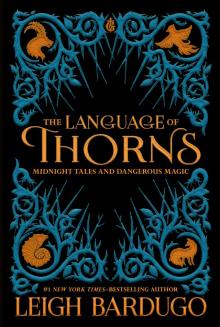 The Language of Thorns: Midnight Tales and Dangerous Magic
The Language of Thorns: Midnight Tales and Dangerous Magic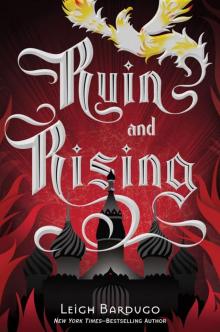 Ruin and Rising
Ruin and Rising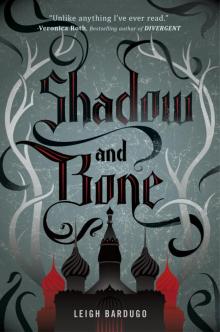 Shadow and Bone
Shadow and Bone The Demon in the Wood
The Demon in the Wood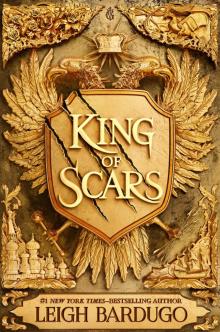 King of Scars
King of Scars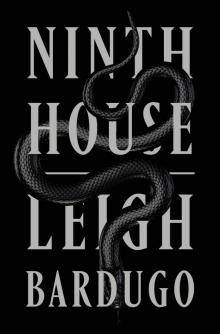 Ninth House
Ninth House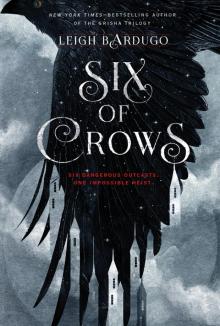 Six of Crows
Six of Crows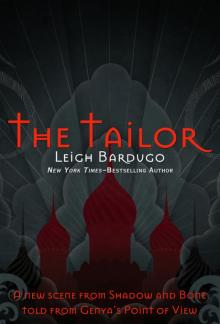 The Tailor
The Tailor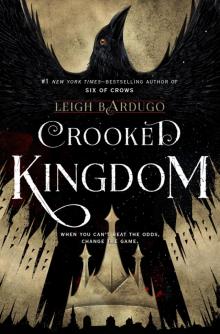 Crooked Kingdom
Crooked Kingdom The Too-Clever Fox
The Too-Clever Fox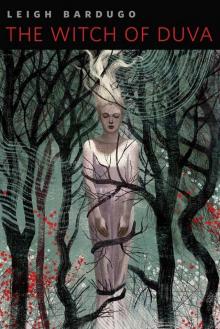 The Witch of Duva
The Witch of Duva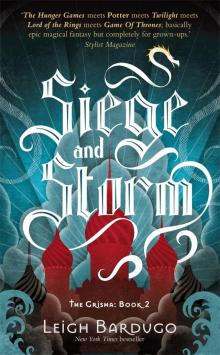 Siege and Storm
Siege and Storm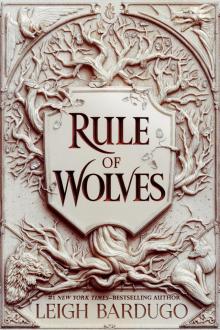 Rule of Wolves
Rule of Wolves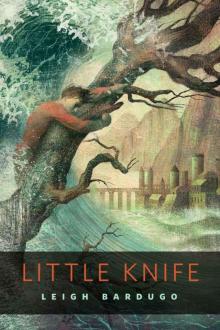 Little Knife
Little Knife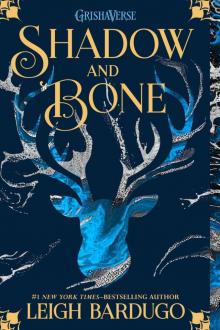 Grishaverse 01 - Shadow and Bone
Grishaverse 01 - Shadow and Bone The Lives of Saints
The Lives of Saints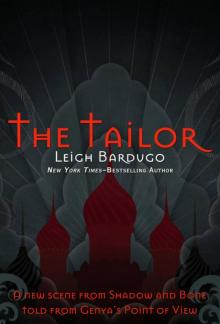 Grishaverse 01.5 - The Tailor
Grishaverse 01.5 - The Tailor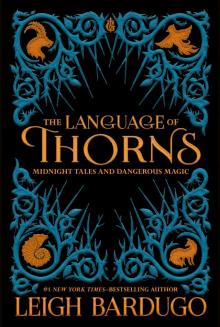 Grishaverse 0.5 - The Language of Thorns
Grishaverse 0.5 - The Language of Thorns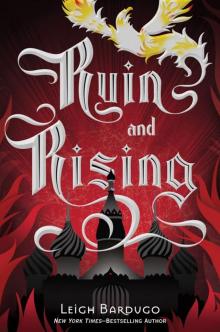 Ruin and Rising (The Grisha Trilogy)
Ruin and Rising (The Grisha Trilogy)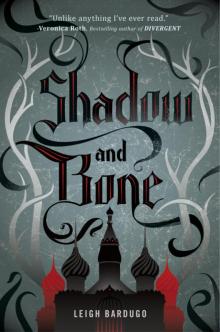 Shadow and Bone gt-1
Shadow and Bone gt-1 Wonder Woman: Warbringer
Wonder Woman: Warbringer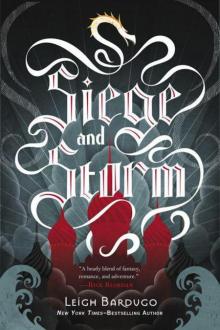 Grisha 02 - Siege and Storm
Grisha 02 - Siege and Storm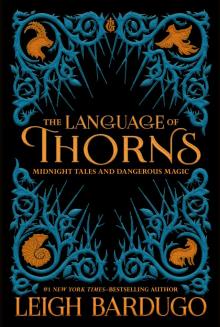 The Language of Thorns
The Language of Thorns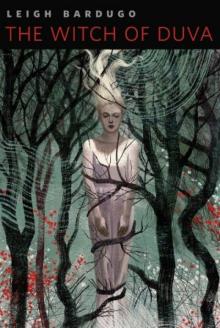 Grisha 00: The Witch of Duva
Grisha 00: The Witch of Duva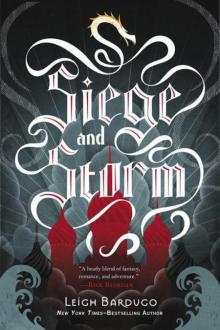 Siege and Storm gt-2
Siege and Storm gt-2 Shadow and Bone (Grisha Trilogy)
Shadow and Bone (Grisha Trilogy)